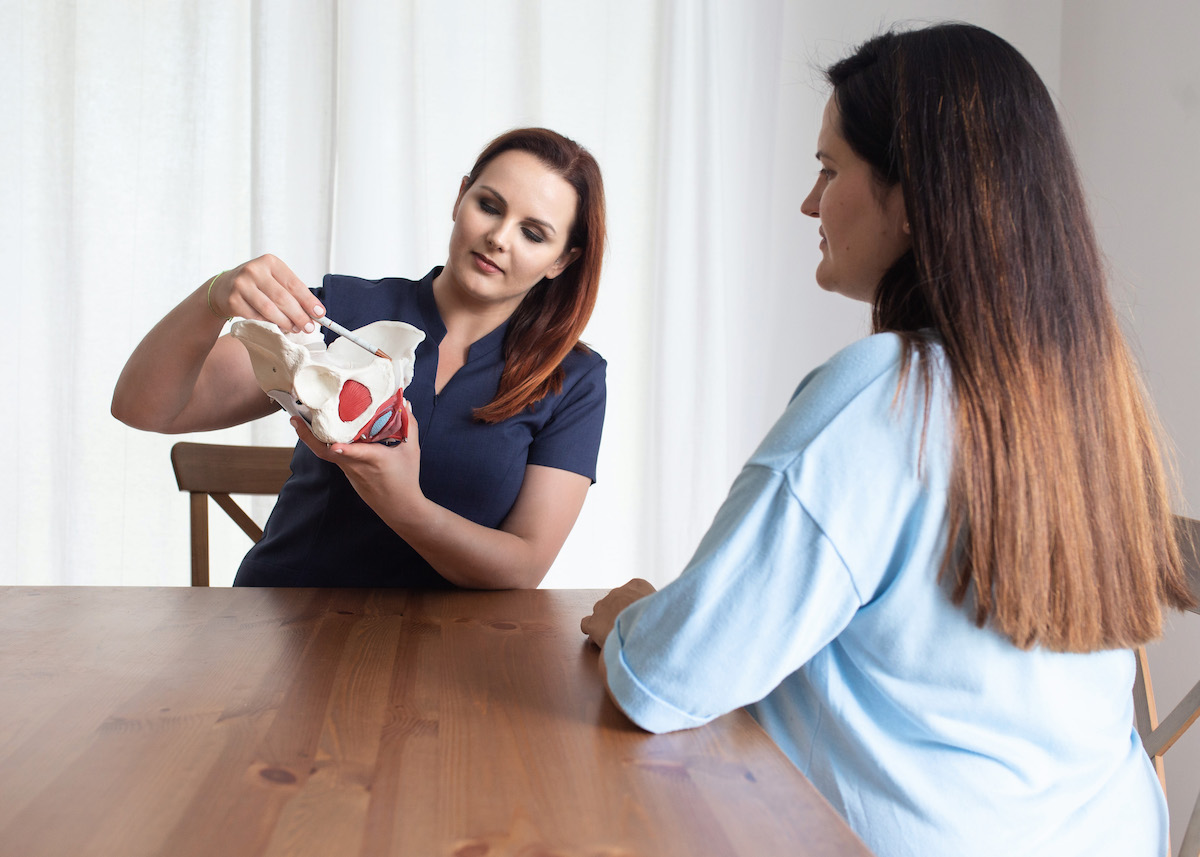How Can Women’s Health Physiotherapy Help My Pelvic Floor?
Pelvic floor dysfunction is a common health issue among women, affecting up to one in three at some point in their lives. Symptoms can range from urinary or fecal incontinence to pelvic pain and discomfort during sex.
However, many women suffer in silence due to embarrassment or lack of knowledge about potential treatment options. Women’s health physiotherapy offers an effective way to address pelvic floor issues and improve overall quality of life.
In this article, we will explore how women’s health physiotherapy can help with pelvic floor problems and what you can expect from treatment.

The Pelvic Floor Muscles
The pelvic floor muscles are easy to take for granted. While they're working well, you don’t really notice them or appreciate everything they are doing. When they aren’t doing their job properly, though, they can cause a range of unpleasant and uncomfortable symptoms.
What is the pelvic floor?
This is a complex structure of muscles, ligaments and fascia that lift and support the organs within the pelvis, like the bladder, uterus and bowel. You may recognise them as the muscles inside your vagina.
This structure of tissue also forms the birth canal and passages for excretion. That's why it affects continence. One function of the pelvic floor muscles is to contract to keep us continent. At the same time, they also need to be able to relax effectively to allow for urination and defecation, sexual intercourse and childbirth.
What is Pelvic Floor Dysfunction?
When your muscles and ligaments cannot properly support the organs of your pelvis, you may experience any one of a wide range of disorders. This problem is known as pelvic floor dysfunction.
The muscles may become damaged or weak. They could also be overly tight, a condition called hypertonic pelvic floor.
It can be a complicated condition, though. In some cases, your pelvic floor muscles can even experience symptoms of both too much AND too little tension in different areas at the same time.
Causes of Pelvic Floor Dysfunction
It's common for women to experience weakness in these muscles after pregnancy and childbirth—especially vaginal birth. But it can also develop during menopause and perimenopause or be caused by trauma to the pelvic region, such as infection or gynaecological investigation and intervention.
Symptoms of Pelvic Floor Dysfunction
If your muscles are too weak or too tight, they will not be supporting your organs properly. Pelvic floor dysfunction can manifest itself in many ways, including:
Urinary or bowel incontinence: The involuntary leakage of urine or faeces.
Pelvic organ prolapse: A condition where one or more organs in the pelvis drop down from their normal position.
Painful intercourse: Pain during or after intercourse can be caused by tight or spasming pelvic floor muscles. Inability to reach orgasm can also be a symptom.
Lower back pain: Pain in your lower back, pelvis or genitals can all signify problems with your pelvic floor health.
Chronic constipation: Difficulty passing stool due to weak pelvic floor muscles that cannot relax properly.
Treatment for Pelvic Floor Dysfunction
Pelvic floor dysfunction is very common. Fortunately, there are several treatments available to help cure or manage the symptoms. A women's health physiotherapist will assess your situation and prescribe an effective and effective plan to get you back on track.
Pelvic Floor Muscles Assessment
The women's physio will conduct an external and internal assessment to determine the condition of your pelvic floor muscles. From there, they will develop a programme tailor-made to specifically tackle the symptoms you are experiencing.
If you've never had an examination like this before, don't worry! There's really nothing to worry or be embarrassed about. During the exam, you will be asked to try and initiate or hold a pelvic floor contraction. This might be easy or difficult for you, depending on the condition of your muscles.
- If you're not able to contract your pelvic floor, your therapist will work with you to teach you how to correctly engage those muscles.
- If your muscles are already too tight and contracted, you will learn techniques to relax them through internal manual therapy, including trigger point release, myofascial stretches and massage.
The PERFECT Scheme for Pelvic Therapy
One of the first researching pelvic physiotherapists, Jo Laycock, developed the PERFECT scheme, which is a standardised method of evaluating these muscles. The plan looks at:
- Power - a measure of the strength of voluntary contractions
- Endurance - how long a maximal voluntary contraction can be held (up to 10 seconds)
- Repetitions - how many maximal voluntary contractions can be held with a rest in between, up to 10 reps (for example, 10 repetitions of a 10-second hold)
- Fast - the number of 1-second maximal voluntary contractions that can be performed in a row (up to 10)
- Every Contraction Timed - a reminder to time every contraction
Improve Your Pelvic Floor Muscles Function
A structured approach can be extremely effective at resolving or improving symptoms of pelvic floor dysfunction. A women's health physiotherapist will determine the best course of action for your specific problems and set you up with a plan to tackle them.
Depending on your particular symptoms, the approach might include:
- Exercises to re-train your pelvic floor
- Muscle stimulation to educate and improve your ability to contract or relax your muscles
- Stability training pelvic exercises to improve abdominal muscle strength
- Exploration and treatment of any pain in the lower back or pelvis
- Visceral mobilisation
- Internal and external manual therapy
- Breathing techniques

Who Can Benefit from Women’s Health Physiotherapy for Pelvic Floor Dysfunction?
Most women can benefit from women's health physio at some point in their lives. Here are some examples of how women's physio can improve your pelvic floor symptoms:
1. Anyone who is pregnant, trying to get pregnant or recently gave birth
Pregnancy and childbirth put a lot of strain on the pelvic floor muscles, leading to weakening and damage. Women's health physiotherapy before and during pregnancy can strengthen these muscles, improving the birthing experience and reducing the risk of urinary or fecal incontinence postpartum. Following childbirth, physiotherapy will help restore normal function.
2. Menopausal women
As estrogen levels decrease during menopause and perimenopause, the tissues in the pelvis become thinner and drier, increasing the risk of prolapse and urinary incontinence. The right exercises will help maintain muscle strength, reducing the chance of prolapse developing.
3. Athletes
Athletes who participate in high-impact sports like running or jumping may experience issues with their pelvic muscles due to the repetitive motions. It's essential for athletes to maintain good muscle tone, so they should seek guidance from a qualified women’s health physiotherapist.
4. Those who suffer with chronic constipation or urinary or fecal incontinence
Leakage of urine or faeces is a common problem for those with weak pelvic floor muscles, while constipation can be the result of overly-tight muscles. Targeted treatment can alleviate all of these conditions.
5. Those with chronic pain
Women who have suffered from pelvic floor dysfunction for some time may experience chronic pain related to the condition. Physiotherapy can provide some relief through muscle strengthening together with targeted pressure point therapy to release tension in affected areas.
6. Women experiencing painful sex
When sexual intercourse is painful, there are a number of conditions that can be causing problems, like tightness, dryness, or muscle spasms. A women's health physio can help with all these symptoms and get you back on track.
To find out how women’s health physiotherapy can help your pelvic floor, call Magdalena on 07877 017 936 or drop PelviCare an email for a no-obligation chat. Alternatively, you can book an appointment online for treatment.
PelviCare Women's Health Physiotherapy is located in Greenwich, London, serving women across South London, East London, Essex, Kent and beyond.
Recommended Articles:
How do You Know if You Need Pelvic Floor Physio?
What Does an Antenatal Physiotherapist Do?
